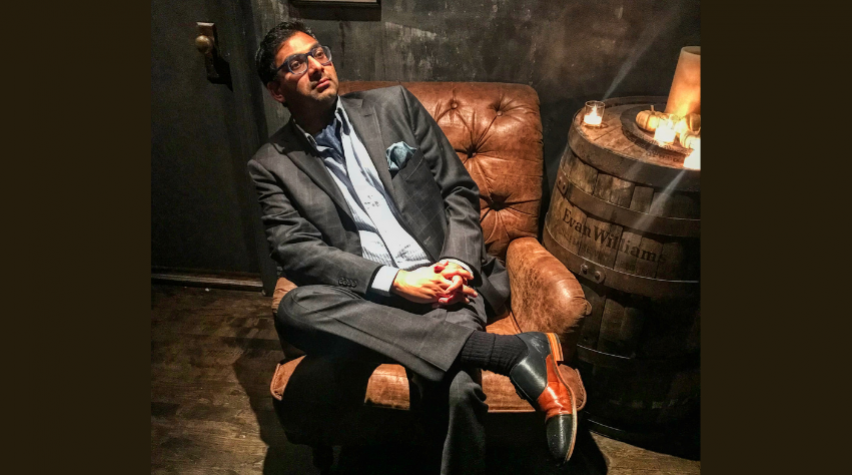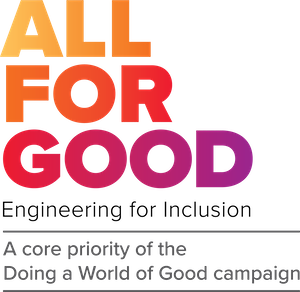
AIChE presents the most recent post in this series featuring LGBTQ+ engineers and their allies as part of an ongoing effort to share stories of equity, diversity, and inclusion. Other related efforts include the LGBTQ+ & Allies Engineering for Inclusion Panel, held at the 2020 Virtual Annual Meeting, networking events for LGBTQ+ members and allies, as well as Safe Zone LGBTQ+ Ally Training workshops.
All aforementioned initiatives are supported by the AIChE Foundation's Doing a World of Good Campaign. In this installment of our series, we interviewed Nemoy Rau, who shared his story as an LGBTQ+ ally and ChemE entrepreneur.
Tell us a bit about your job and your job responsibilities. What’s a typical day at work?
Entrepreneurship can be sexy, and everyone sees an app or watches Shark Tank and thinks they want to do it. But founding a startup is one of the riskiest things a person can do, and founding a healthcare startup is madness. I’m a cofounder of a medical device company focused on diagnostics and treatments. We are now entering an age of personalized medicine powered by data and evidence-based care. It's common to see tech in general grow rapidly, but tech areas related to healthcare such as MRI technologies, computer-aided detection, and computer-aided diagnosis have grown equally, if not further in the same time period.
As part of the founding team in a healthcare startup, I end up wearing many hats day to day, and I've gained skills that I never learned in the classroom. There is a heavy R&D component to my work, but it's key to translate that research to a commercialized product. It requires working with experts and teams in the development period, whether it is in patient testing or with the end user. For me, the journey of a healthcare entrepreneur is driven by understanding strategy, which is crucial at every stage of product development and entering the market with a new product or service.
Some examples of strategies are: patent strategy for what you are trying to protect and the patent life, your independent claims, and countries you are ‘putting up your fence’; understanding the regulatory and compliances for agencies such as FDA (and their equivalents in other countries); monetizing your service or product and developing a sustainable business model for your pricing structure; payment system structure in varying healthcare systems where maybe the user and the payer are two completely different people; creating supply chain and manufacturing strategies to meet the demands; and understanding how to scale up to grow your company from $5M -> $50m -> $500m -> $5B in sales.
By reserving space in your capitalization table for [accredited] LGBTQ+ investors, founders can bring diversity and representation to companies at the early stages...
I am also a partner with an early-stage venture capital firm where I focus on defense, medical intelligence, biotech, and deep tech areas. In this role, I’m always meeting with founders and founding teams throughout the country to identify and understand new technology, industry, and business trends. I perform due diligence and research, getting to know the team, evaluating the product, speaking with customers to understand how the product compares to its competitors, and understanding the benefits and risks along with the strategies to commercialize the product.
Many times, entrepreneurs introduce a new technology, and we will mentor and advise them on how to create a business model and how to develop the payment structure(s) and costs. We look at supply chain, manufacturing, geopolitical changes, or even changes in markets such as COVID-19. We create avenues for strategic collaborations, joint ventures, or strategic investments with other companies.
Do you have suggestions for other allies regarding resources that provide support for people in the role of ally?
Generally speaking, early-stage startup companies have not had open LGBTQIA+ investors engage as investors, advisors, or as board members. Venture capital is notoriously known to lack any sort of diversity whether it is by race, gender, alma mater, etc. Many tech companies have LGBTQ+ people as a part of their team and are looking to engage with startups and even reap the monetary rewards and benefits of venture investing.
Unfortunately, many LGBTQ+ people have not been able to participate even as angel investors, which may have limited the financial returns typical from successful investments. By reserving space in your capitalization table (the capitalization table gives an analysis of a company’s percentage of ownership, equity dilution, value of equity in each investment round, and other information regarding company structure) for accredited LGBTQ+ investors, founders can bring diversity and representation to companies at the early stages in different markets such as direct to consumer, business to consumer, and in important areas such as healthcare.
With so many brands and companies having frequent misses and poor publicity of mistakes, having diverse investors and people involved can help provide companies with a diverse voice. While many older institutions and investors generally don’t like to see this much diversity, it is up to us to speak up, advocate and defend these decisions and recognizing the value, expertise, and experiences LGBTQ+ investors can bring to a founding team or startup. When people see you standing up, more people see your character and are inspired to work with you in the future in multiple capacities.
Do you have any suggestions of what allies of LGBTQ+ people can do to help make their professional climate safer, more welcoming, and inclusive for diverse engineers?
Over our careers, we are seeing more volatility in our jobs. Our careers by nature are becoming more multi-disciplinary and we are engaging with more people than ever before. Some fields might have more LGBTQ+ people, and it is up to us to recognize them. In meetings, don’t allow them to get ignored. Include them in your projects or work to encourage a more-welcoming, all-inclusive, and team-based environment. Continue to advocate for them as they also look to grow in their own careers.
Take LGBTQ+ discrimination seriously and make sure all employees and co-workers know what is not tolerated in the workplace. In cases of homophobic bullying, promptly recognize the problem and take action. Look to gain support from senior staff from the very top and promote senior staff champions who can implement diversity initiatives, mentor junior LGBTQ+ colleagues, and act as sponsors of employee networking groups.
Lastly, it is important to keep track of success. Celebrate your successes and monitoring your progress by tracking things such as number of employee grievances, completion rates of diversity training, LGBTQ+ hires and promotions, and how many new employees have come out, can all be critical for making a more-welcoming and inclusive workplace.
How could AIChE help you to fulfill your professional and personal goals?
I’ve been leading the entrepreneurship activities at the institute to really help founders and startup teams help bridge the lack of venture support in chemicals and other deep tech areas created by chemical engineers that normally do not get the support at the early stages analogous to typical mobile apps, SaaS, and software plays.
Through The Center for Innovation and Entrepreneuring Excellence (CIEE), we’re looking to create events and support tailored for people on both sides of the table, both investors as well as entrepreneurs. We’re looking at providing deal flow and deal memos, investing conferences, founder networking, mentoring, coaching, advising, and other activities to support angel investors, venture capitalists, private equity and growth investors, corporate venture arms as well as founders and startup teams.
After seeing this past year of COVID-19 responses and understanding from a public health perspective, I continued to see a failure in information dissemination. Being in areas where there is a lot of pioneering of new fields, there needs to be a lot of STEM and technology policy, regulatory affairs, and compliance on how we utilize new technologies, services, policies, or platforms.
I want to be more active with AIChE in these areas to engage and bring nonpartisan scientific, medical, and technological data and research to create a vehicle for scientific knowledge diffusion. This would be for the public as well as local, state, and federal policymakers and officials, recommendations, governance, social impacts, and responsible regulation on the impacts of new technologies, and to help stimulate scientific research in public and private sectors.
 Here, Nemoy is pictured kiteboarding and "wiping out" after being dragged 50 yards. He feels this demonstrates the endless ups and downs of entrepreneurship and the tenacity required to keep going.
Here, Nemoy is pictured kiteboarding and "wiping out" after being dragged 50 yards. He feels this demonstrates the endless ups and downs of entrepreneurship and the tenacity required to keep going.
Are there any LGBTQ+ inspirations, role models, or moments in history that are important to you?
I appreciate seeing and reading the history in the early 1980s with how researchers and the gay community really came together at the beginning of the AIDS/HIV epidemic and tried to convince the CDC and the medical community, while breaking barriers, to the idea of what the medical community called GRID (gay-related immune deficiency).
This is even more pointed in today’s context on how individuals and groups like researchers, members of the medical community, and national public health institutes, can engage on policy when new diseases appear, whether it is a state-led chemical or biological weapon, or an emerging pathogen or infectious disease (such as SARS-CoV-2) with human-to-human transmissions that can have vast effects.
Do you have a story about an effective or inspirational professional ally or LGBTQ+ person you’d like to share? Or a personal story related to an LGBTQ+ friend or family member?
Being raised in the corn fields of Indiana, I recognize how valuable farmers are for all of us, even more so after COVID-19. Many of us forget that we are only three to four generations removed from being farmers (and a more agrarian society). I really admire Land O’Lakes CEO Beth Ford for being the first openly gay woman CEO of a Fortune 500 company.
As a Hoosier, the Land O’Lakes business model and culture resonates with me. They are farmer-owned, respect family-owned farms, and they recognize the dramatic increase in women-owned farms in the last 10 years. In the 2012 census women were principle operators of 13.66% of farms. In the 2017 census that number grew to 29.13%. A little more than 36% of American producers were women as reported by the 2017 census, which was an increase from 31.5% in 2012, according to the 2017 USDA Census of Agriculture.
As a role model for many parents and women, Beth Ford continues to show how lesbians can work with non-traditional backgrounds, grow to an executive track career, have families, and engage on policy and technology advocating for changes in industry.
What’s your dream getaway?
I want to spend a month going around Kyoto and spending time seeing multi-generational businesses of unique art, music, pottery and other traditional Japanese culture and processes conducted for centuries that may have been substantially hit after the coronavirus.
Do you have a favorite LGBTQ icon?
If you were a kid in the 80s, and especially if you went to Space Camp or other related STEM camps, you most certainly knew Sally Ride, a Presidential Medal of Freedom recipient, the first American woman (third overall after the two Soviet cosmonauts, Valentina Tereshkova and Svetlana Savitskaya) and STILL the youngest American astronaut in space. She continues to inspire many young women and LGBTQ+ women that it is okay to love math and science and aspire to be an astronaut.
Join AIChE's LGBTQ+ & Allies Online Community
This community is open to professional AIChE members who are LGBTQ+ and allies. Topics of discussion will include the ongoing development of LGBTQ+ initiatives at AIChE, plus issues concerning, and opportunities for, LGBTQ+ chemical engineering professionals.
Learn more about the community.
This initiative is supported by the AIChE Foundation's Doing a World of Good Campaign.
AIChE Foundation – All for Good Campaign

Learn more about AIChE's Diversity and Inclusion Initiatives.
Interested in helping?
Are you an LGBTQ+ chemical engineer and AIChE member interested in sharing your story to help create awareness around diversity and inclusion? Are you an LGBTQ+ ally interested in helping with diversity and inclusion efforts? Send us a note at chenected@aiche.org with the subject "Diversity and Inclusion."



Comments
You could leave out all the references to “LGBTQ+“ from the article and it would all apply to everyone - i.e. totally inclusive... Food for thought?
I attempted to do what you suggest above there, Mr. Williams, but failed. The article then made no sense. It is by paying attention to, and finding solutions to specific technical problems in our work that we make the world a better place as chemical engineers. Our workplaces have historically excluded talented individuals due to their identity, race, gender and so on, and we should similarly address that. Ignoring these problems may make people feel better, if they benefit from there being "no problem" on paper. However, it would make our workplaces "totally inclusive" to the same extent ignoring long-standing safety hazards would make our workplaces "totally safe."